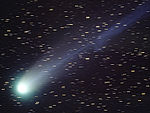20D/Westphal
| Discovery | |
|---|---|
| Discovered by | J. G. Westphal |
| Discovery date | July 24, 1852 |
| Designations | |
| 21P/1852 O1; 1852 IV; 21P/1913 S1; 1913 VI; 1913d | |
| Orbital characteristics | |
| Epoch | 1913-11-09 (JD 2420080.5) |
| Aphelion | 30.030 AU |
| Perihelion | 1.2540 AU |
| Semi-major axis | 15.642 AU |
| Eccentricity | 0.9198 |
| Orbital period | 61.87 yr |
| Inclination | 40.890° |
| Last perihelion | January 3, 1976?[1] (unobserved) |
| Next perihelion | May 4, 2038?[2][1] (lost since 1913) |
20D/Westphal was a periodic comet with an orbital period of 61 years. It fits the classical definition of a Halley-type comet (20 years < period < 200 years).[3] The comet appeared to disintergrate during the 1913 apparition and hasn't been observed since then.[4]
The comet was originally discovered by the German astronomer J. G. Westphal (Göttingen, Germany) on July 24, 1852. It was independently discovered by the American astronomer Christian Heinrich Friedrich Peters (Constantinople) on August 9. The comet exhibited many flunctuations in intristic brightness and reached an apparent magnitude of around 4 while a dust tail was also observed.[4] It was last observed about 120 days after perihelion.[4]
The comet was recovered on September 27, 1913, by Pablo T. Delavan (La Plata Astronomical Observatory), about 60 days before perihelion, however the comet faded as it approached the Sun, losing its central condesation and the nucleus became elongated.[4] The plates of the comet indicate that the disintergration began on October 1, when the comet was reported to be visible with naked eye using averted vision.[4] It was last observed on November 26, 1913. It was predicted to return in 1976[1] but was never observed, and is now considered a lost comet.
References
[edit]- ^ a b c Seiichi Yoshida (2004-02-21). "20D/Westphal". Seiichi Yoshida's Comet Catalog. Retrieved 2012-02-20.
- ^ "Horizons Batch for 20D/Westphal (90000306) on 2038-May-04" (Perihelion occurs when rdot flips from negative to positive). JPL Horizons. Retrieved 2023-02-11. (JPL#19 Soln.date: 2003-Apr-11)
- ^ "JPL Small-Body Database Browser: 20D/Westphal" (1913-10-13 last obs). Jet Propulsion Laboratory. Retrieved 2012-07-26.
- ^ a b c d e Sekanina, Z. (April 1984). "Disappearance and disintegration of comets". Icarus. 58 (1): 81–100. Bibcode:1984Icar...58...81S. doi:10.1016/0019-1035(84)90099-X.
External links
[edit]- Orbital simulation from JPL (Java) / Horizons Ephemeris
- 20D/Westphal, Comet Orbit Home Page
- 20D at Kronk's Cometography
- Orbital elements, Infrared Processing and Analysis Center
- 20D/Westphal – Minor Planet Center

